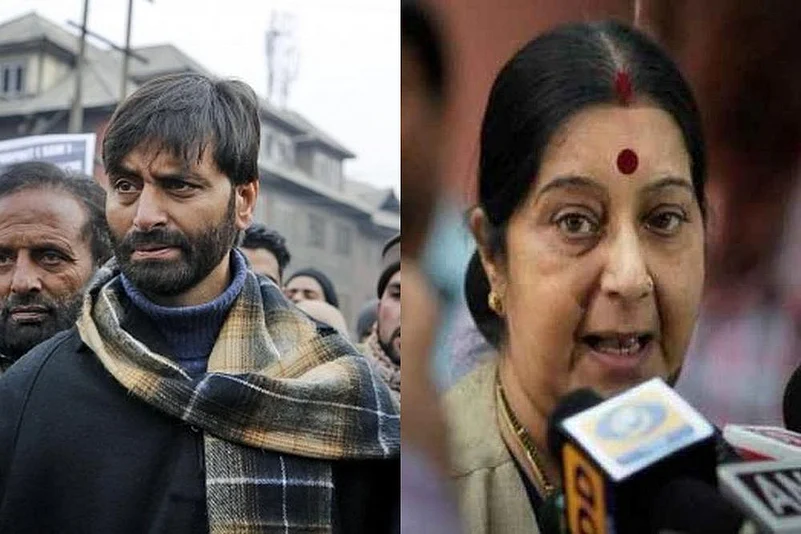Separatist leader and pro-independence, Jammu Kashmir Liberation Front (JKLF) chairman, Muhammad Yasin Malik today wrote a letter to Foreign Minister Sushma Swaraj stating that her emotional speech in the Parliament about Kulbhushan Jadhav’s meeting with his family in Pakistan “touched the chords” of his heart.
“On 28th December 2017, I was listening to your emotional speech you made in the Indian Parliament wherein you in your own words illustrated the ordeal of Indian prisoner Kulbushan Yadhav’s meeting with his family in Pakistan on 25th December. Madam Swaraj, believe me, your words touched the chords of my heart and as a person who has seen the miseries of jail life; I could envisage the tribulation Yadhav’s wife and mother had to go through”, Malik says in an open letter addressed to the Foreign Minister.
“Being an advocate of human dignity, rights of prisoners and ascendancy of kindness over cruelty, I stand for the rights of Kulbushan Yadhav too. No matter who he is and what he has done or what he has been condemned for, he is a prisoner, a captive and every religion, international covenants and human norms endow him and his family certain rights which no one can and should deny”, Malik says, calling upon the Pakistani authorities to be more heedful on the rights of prisoners, welfare of their families, their right to mutual meetings and a fair trial.
Pushing the envelope further, Malik says, being a prisoner himself the Foreign Minister’s speech, however, scratched his wounds. “It recalled me of my old mother’s ordeal, who not once but many a time, in the same manner, after her repeated pleadings to jail authorities, was denied a chance to hug me, her only son, at many Indian jails especially at Tihar.This reminded me of the tears of my sister who could not tolerate to see me from behind a glass wall, talking on an intercom just like Yadhav,” Malik says. “Her plea to touch me was also discarded on the pretext of security reasons”, Malik says.
Bringing the issue of Maqbool Butt and the Parliament attack convict, Afzal Guru, Malik says, “it is India that hanged Kashmiri freedom fighter Muhammad Maqbool Butt without allowing him the last meeting with his family members. His younger brother late Ghulam Nabi Butt, who wanted to travel to Delhi to receive his elder brothers corpse, was arrested at Srinagar airport. Maqbool Butt in absence of his family members was buried inside the Tihar jail.”
Butt was hanged in Tihar jail on February 11, 1984, after being convicted for his involvement in the killing of a CID inspector.
“It is India that, without proving his guilt and just on the pretext to ‘satisfy the collective conscience of India masses, hanged another Kashmiri youth, Muhammad Afzal Guru in 2013. It is on record that he not only was denied a last chance of meeting his 12-year son, 80-year-old mother and a wailing young wife but even his proper burial was denied by the Indian authorities. The families of these two Kashmiris are still waiting for their mortal remains to be handed over to them. Isn’t it a grave Be-Adabi of humanity too?”, Malik asks.
Malik says “there are thousands of Kashmiris who have disappeared after being picked up by Indian forces from their residences and their families are yet clueless about their whereabouts. Their wives have been named as ‘half widows’ (a newly introduced terminology) by well reputed international human rights organizations. The continued agony of these families is also worth consideration.”
Malik says he agrees with the legitimate questions raised by the foreign minister in her speech about the rights of a prisoner and his family including the right to hug a mother, to touch his wife and to see his children.
“But this principle should hold same for every prisoner be he a political prisoner, a freedom fighter, a criminal, or any other lawbreaker. I recently met with the families of some prisoners from Kashmir who are in Tihar jail, held for their political beliefs. During my meeting with their kids and wives, they narrated before me the stories of same malice and humiliations. Daughter of one of these asked me to do something so that she is permitted to touch her father’s face”, Malik says.
















